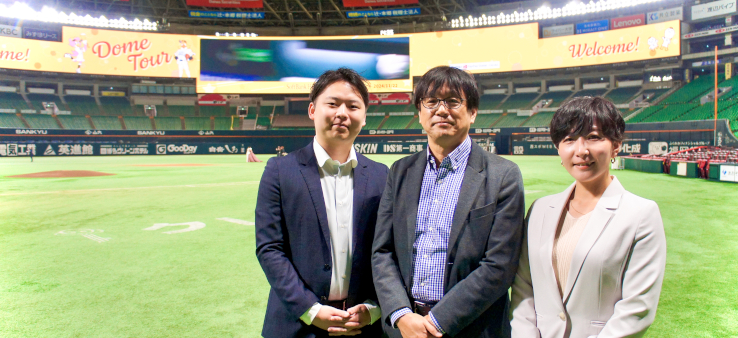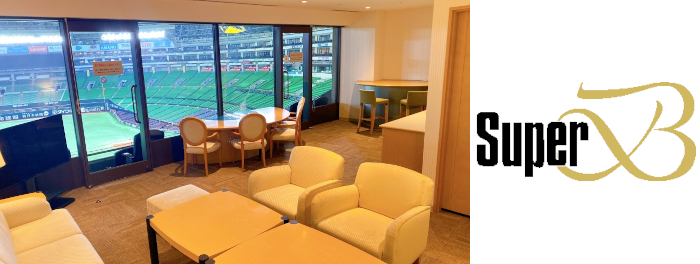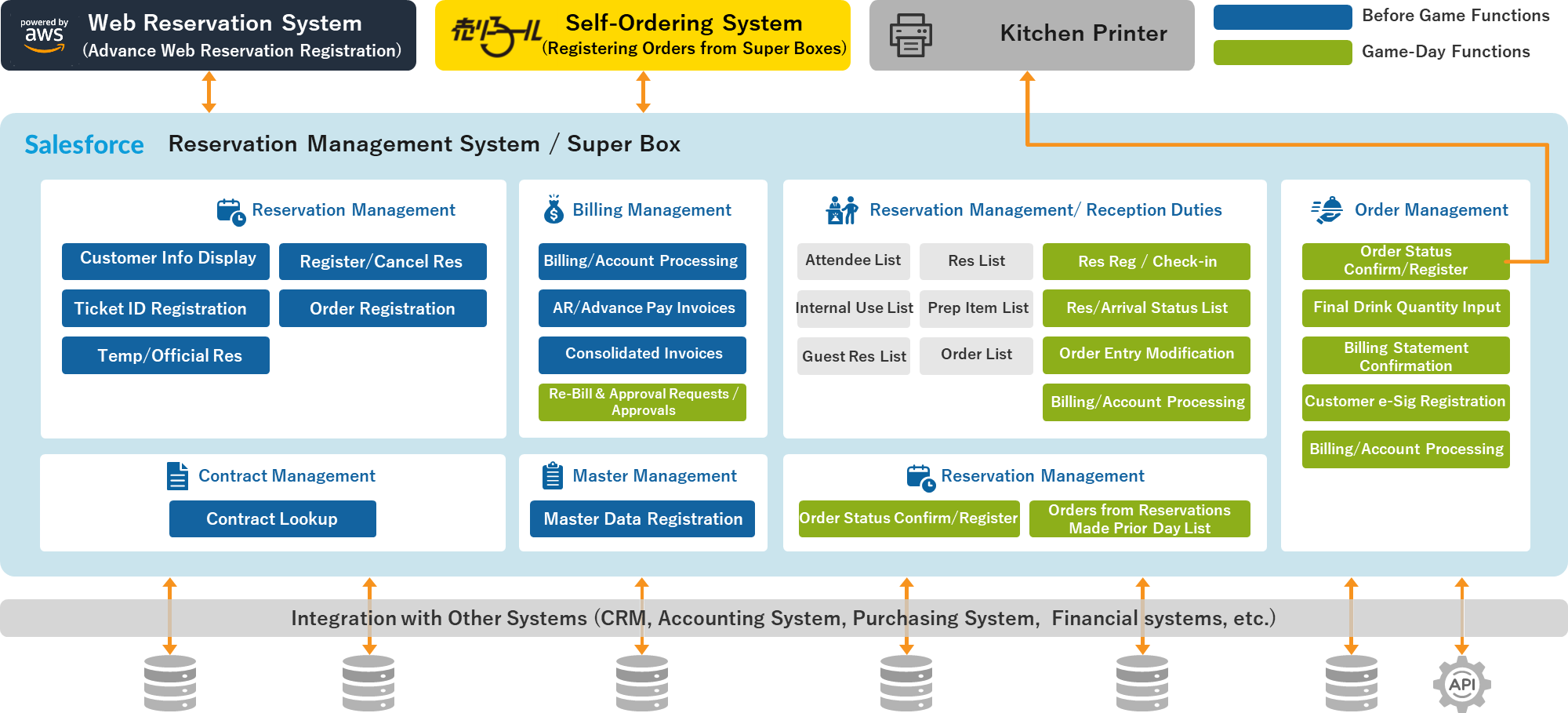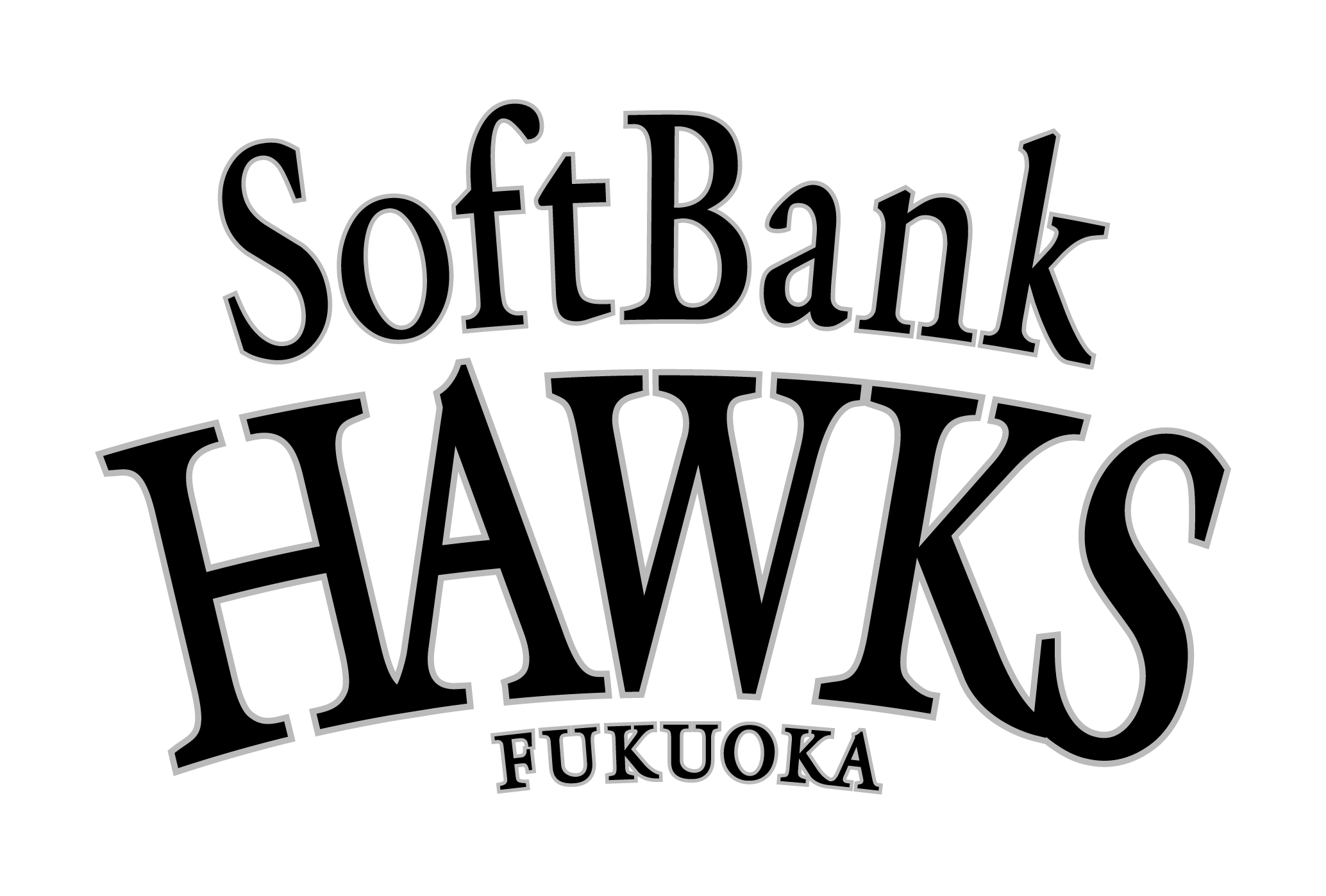Enhancing Service Quality and Operational Efficiency of VIP Rooms through Integration of Salesforce, AWS, and Mobile Ordering System

Satomi Naya, FB Services Section, Food & Beverage Development Department, Business Operations Headquarters (Photo: Right)
Yutaka Nishida, Information Systems Department, IT Division (Photo: Left)
The lack of integration and aging of the three systems supporting the VIP rooms were obstacles to improving service quality and operational efficiency.
“Strive for Number One in the World” is the slogan of the Fukuoka SoftBank Hawks, a perennial powerhouse in Japanese professional baseball. The team has won the league championship and Japan Series a total of seven times since 2010. The team’s operating company, Fukuoka SoftBank Hawks, upholds a “Fan First” philosophy and strives for world-class customer service. By continuously offering alluring experiences to fans, the team has grown into one of Japan’s most popular baseball clubs.
One of the services that Fukuoka SoftBank Hawks has been offering for many years to enhance fan engagement is the Super Box VIP rooms, providing an extraordinary experience on the 4th through 6th floors of the Hawk’s home stadium, Mizuho PayPay Dome. A dedicated gate provides exclusive access and guests can enjoy watching the game in comfort in premium seats, and a wide variety of food choices prepared by gourmet chefs ensures the highest level of hospitality. The primary clientele consists of corporate partners with annual contracts, who use the service for business meetings, client entertainment, and the well-being of their employees. The number of VIP rooms at 117 is notably higher than that at other stadiums, making it an essential service for the Fukuoka SoftBank Hawks.

The Super Box VIP rooms, which began operations when the dome opened in 1993, have played a significant role. However, behind the scenes, the operation team faced numerous challenges stemming from the three systems supporting the service: the reservation management, the web reservation, and the self-ordering. Toru Yoshimura, Director of the Business Operations Division, reflects on this:
“First, the reservation management system, which inputs and manages reservation information submitted through sales representatives, had become outdated after more than 10 years of use and could no longer adapt to changes in the times or business practices. The web reservation system, where customers enter information such as the number of people and meal orders in advance, had also been in use for over five years, and the website’s appearance was outdated. Additionally, it didn’t display correctly on smartphones, among other issues. Furthermore, the self-ordering system, which allows customers to order food and drinks from an iPad in their rooms, faced problems due to a time lag in reflecting inventory status on the screen. As a result, customers were able to place orders for items that were actually sold out, causing discontent.”
Additionally, as each system was built by a different vendor, with differing platforms and data structures, there were challenges in data integration, which resulted in delays. Troubleshooting during system failures was also difficult, and overall, the speed of operations and improvements was lacking.
| Aging Reservation Management System |
|
| Issues with the Web Reservation System |
|
| Inefficiencies in the Self-Ordering System |
|
The proposal from Uhuru to overhaul and integrate the systems by linking Salesforce, AWS, and Uhuru’s mobile ordering system was accepted.
To improve customer convenience and experience, as well as streamline operations, The Hawks decided to consolidate their vendors and launched a project to overhaul and integrate their systems. Five vendors were considered as potential partners, and Uhuru was among them. The Hawks had already worked with Uhuru, having adopted the Uri-Call system to enable spectators to order food and drinks from their seats in the stadium, a connection was already in place.
Ultimately, the reason Uhuru’s proposal was chosen was because of the system architecture that utilized Salesforce, AWS, and Uri-Call, which made it easier to imagine integration with Salesforce, a customer relationship management (CRM) system that had already been implemented for sales just before the project began, says Yutaka Nishida, Head of the Information Systems Department in the IT Division.
“The most challenging aspect of this system overhaul was automating the process of inputting reservation information into the system. Previously, sales representatives had to manually input customer reservation details into the sales system, and then the staff responsible for the Super Boxes had to re-enter the information, which was printed on paper, into the reservation management system. With Uhuru’s proposal, the integration between Salesforce systems allows the information entered by the sales team to be directly imported into the reservation management system, which will speed up data integration and improve operational efficiency.” (Nishida)
Other points in the selection process included Salesforce’s strong security features and the reassurance of regular updates (three times per year), ensuring the system could be used with confidence.
Regarding the progress of the project, Nishida shares the following:
“By having Uhuru create prototypes as needed during the project, we were able to share our vision of the final product with the Super Box staff from the development stage. It was extremely helpful, especially because we could clearly see how the screens and reports would look. This made it easy to envision the user interface and usability from our guests’ perspective, and how our staff would use the system on-site, thus we were able to move forward with the project while aligning on goals as a team.” (Nishida)
In addition, when it came to operations after the system had been built, Uhuru provided training and operational simulations to our staff before the season started, and constant on-site assistance until our staff became familiar with the system, which helped shorten the period of time required to stabilize our operation, Nishida recalls.

Visualization of real-time room availability and reservation status through data integration, enabling optimization of sales and services.
The newly constructed system has brought about a revolution in the Super Box service. First, the reservation management system. When a sales representative enters reservation information into the Salesforce sales system, it is automatically registered in the connected reservation management system. And in reverse, room availability information in the reservation management system is also synchronized in real-time with the Salesforce sales system. Satomi Naya, of the Business Operations Division, Food & Beverage Development Department, FB Services Section, discusses the convenience of the new system:
“Previously, reservation information had to be manually entered and synchronized, which inevitably caused a time lag in sharing information. As a result, the sales team couldn’t see the actual room availability, and the staff didn’t know which customers were coming until just before the event. With the new system, however, the sales representatives can see real-time room availability, tentatively hold time slots, and follow-up with clients. Once a reservation is confirmed, they can input the final details, enabling quick and accurate actions based on the actual situation. On the operations side, staff can immediately see how many reservations are scheduled for each day, how much food is needed, and what kind of customers are expected, allowing for smoother preparation for customer service.” (Naya)
Meanwhile, the web reservation system, built on AWS, has been redesigned with a rich look and feel, well-suited to guests who visit our Super Box website, and it also now works with smartphones. Moreover, we can now do things that we could not do before.
She continues: “In the past, due to the time lag in reflecting information that customers entered into the system, we set deadlines for advance reservations, such as for course meals, to be five days prior to the event. After this deadline, reservations could no longer be made online. However, with the new system, there is no time lag, so if customers make a request, we can instantly change the reservation deadline or make other adjustments. Additionally, by linking with the reservation management system, we can automatically send reminder emails at the optimal times—such as when a reservation is made for a certain date or when the deadline for pre-ordering course meals is approaching, prompting customers to pre-order their meals.”
Efficient Service with Integration to the Mobile Ordering System
What greatly improved both customer convenience and operational efficiency on-site was the self-ordering system based on a mobile order platform. As mentioned earlier, the “Superboxes” have 117 rooms, and each game typically sees around 1,000 customers arrive around the same time, placing orders. And toward the end of the game, they all simultaneously settle their bills. We never had a system that could handle all this smoothly.
For example, when a customer ordered items through the iPad in their Box using the old system, a ticket would be printed out on paper in the kitchen which was then posted on a whiteboard. This meant that both the kitchen staff and servers had to constantly check the board while performing their other tasks, keeping track of whether there were any delays or issues with the progress of each order. Similarly, for billing, paper receipts printed at the front desk had to be taken to each room to collect payment, and handling split payments meant staff would sometimes need to return to the front desk, causing delays and extra work.
Although the on-site staff’s expertise and experience allowed us to manage some of these issues, there would inevitably be problems such as delays in cooking or serving, or not finishing the billing process before the end of the game.
With the new self-ordering system, orders are displayed in real-time on screens in the kitchen and on the serving staff’s mobile devices, allowing everyone to easily track the status of each order, such as “preparing” or “served.” If there are delays, alerts in red appear, making it easy to visually monitor overall progress.
“Regarding billing, processes like splitting payments or issuing receipts can now be done directly on the iPads in the Boxes or on the serving staff’s mobile devices, eliminating the need for multiple trips between the Boxes and the front desk. This dramatically decreased the number of trips staff have to make.” (Nishida)

Achieved a 10-20% increase in reservation registration rates and a reduction of approximately 98% in paper usage with a system that exceeded expectations while delighting both customers and staff.
The improvement in service quality and operational efficiency at the Super Box due to the system upgrade and integration is clearly reflected in quantitative terms. For example, improvements in the screen/UI of the web reservation system and the initiation of automatic reminder emails have led to a 10-20% increase in the rate of food and beverage reservations, and sales have increased by a similar margin, based on subjective estimates.
“We believe that part of this improvement can be attributed to the simplification of the login process for the web reservation system, which changed from customers needing to manually enter a number found on the paper ticket that was mailed to them, to simply clicking a link in the email. This also allowed customers to easily check their past order history, which likely contributed to the increase.” (Naya)
In terms of service quality, the reduction in time to pay the bill cannot be overlooked. Each transaction now takes about 10 minutes less than it used to. In previous seasons, there were typically around five games where billing was not completed before the end of the game. However, during the 2024 season, the first after the system upgrade, that never happened.
The new system has also demonstrated its effectiveness in improving operational efficiency and productivity. For example, in terms of paperless operations, accounting details, receipts, invoices, and kitchen/serving instructions have all been digitized, reducing the number of printed pages by approximately 98%. Additionally, with the integration of Salesforce for real-time tracking of room availability, inquiries from sales staff to the operations department regarding room availability have decreased by about 30%. Furthermore, the integration of credit management with the system has eliminated the need for sales staff to manage accounts receivable or advance payments via shared Excel spreadsheets with the accounting department, reducing that labor by about 10%.
As a result of these improvements in operational efficiency, there has also been a shift in the mindset and work approach of on-site staff. As Mr. Nishida explains:
“For example, staff members no longer need to check the whiteboard to track progress on preparing, serving, or clearing tables. They can view this information on their mobile devices. As a result, they are freed to think for themselves, such as ‘Since not many orders have come in yet, I’ll take this opportunity to clear the plates’ or ‘I’ll go help in this Box, which seems to be getting busy.’ This has allowed staff to focus more on providing better service for our customers.” (Nishida)
Mr. Yoshimura emphasized that the improvement in operational efficiency is directly linked to the primary objective of the Super Boxes”—enhancing the customer experience. He concluded:
“In that sense, this project has far exceeded our expectations, and we’ve been able to create a system that makes both the customers and staff happy. It’s not just about improving operational and management aspects (‘defense’), but also about improving the service provided to customers (‘offense’). I would highly recommend this system to others in the same industry.”
Company Overview

Fukuoka SoftBank Hawks
2-2-2 Jigyohama, Chūō-ku, Fukuoka City, Fukuoka Prefecture, 810-0065, Japan
Leveraging the strength of owning both the baseball team and the stadium, the company contributes to the development of sports culture in Fukuoka and the Kyushu region, as well as the revitalization of local communities. As a company rooted in the region, the Hawks cherish their bond with fans, aiming to grow together through various events such as “Taka Matsuri SUMMER BOOST” and “Pink Full Day,” along with daily interactions with fans.
In addition, breaking out of the traditional framework of the baseball business, the company operates BOSS E・ZO FUKUOKA, an entertainment facility located next to the PayPay Dome. They continue to create new business opportunities and challenge themselves with diversified ventures beyond their original scope.
Business Activities
Ownership of a professional baseball team, Operation of baseball competitions, Management and operation of sports facilities, including baseball-related facilities, Content distribution services using various media, including video, audio, and data
CONTACT
For inquiries and requests please click the CONTACT FORM button.


